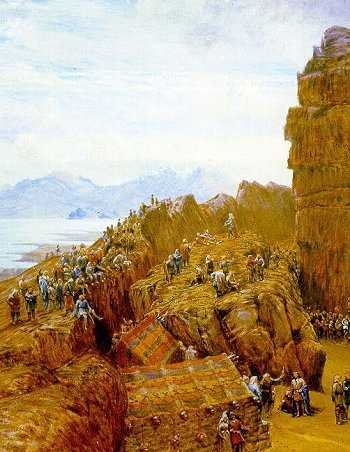The Viking impact on the world began in 793 AD with the raids on monasteries and other targets documented by the Anglo-Saxon Chronicle. Although historians and archaeologists agree that the Viking Age and Norse influence ended in 1066 with the Battle of Stamford Bridge, some of their influences continued into the modern age in the English language. This post looks at some of those words.
(Source: Wikipedia)
The English language is influenced by a lot of different cultures and the lasting legacy of the French speaking Normans is the most obvious, but it also includes West Germanic languages and Latin. However, hidden in between these influences, the Vikings are noticeable. First of all, we have some of the days of the week names after Norse Gods. See our short Blog post on this subject by clicking HERE. Below we look at some of the other words in everyday English use, the bracketed word is the original Old Norse.
The Vikings brought violence with them and also a lot of words describing violence and weaponry, such as berserk (berserkr), club (clubba), ransack (rannsaka), scathe (skaða), slaughter (slatra), even the word gun derives from the Old Norse name Gunnhildri the meaning of the two words Gunn and Hildr can mean war and battle!

The Battle of Stamford Bridge by Angus McBride
Other words reflect the Viking society that dominated British life under the Danelaw. Words such as Bylaw (bylög village-law), heathen (heiðinn one who inhabits the heath or open country), and Hell has it's origins in the Norse Goddess of the underworld Hel. Husband is made from the two words hús (house) + bóndi (occupier), law from lag, sale was originally salla, and skill was skil in Old Norse. The modern English steak can be traced to steik meaning 'to fry', thrall – þræll (slave), to be thrifty was þrift (prosperity), other words include troll, saga, and Jul from jol a pagan winter solstice feast.

Viking Age Dublin by Simon Dick
It doesn't end there! We have names for animals largely from the Anglo-Saxons, but many Norse words crept into the language, such as: bug – búkr (an insect within tree trunks), bull – boli, reindeer– hreindyri, skate – skata (fish) and wing–vængr.
You want more? Here is a massive list of more Norse words that we still use today.
barkbǫrkr
baskbaðask(reflexive of baða, “to bathe”)
billow– bylgja
blunder– blundra (to shut one’s eyes; to stumble about blindly)
call–kalla (to cry loudly)
cast– kasta (to throw)
choose – kjósa
clip – klippa (to cut)
crawl – krafla (to claw)
gawk – ga (to heed)
get – geta
give – gefa
glitter – glitra
haggle – haggen (to chop)
hit – hitta (to find)
kindle – kynda
race – rás (to race, to move swiftly)
raise – reisa
rid – rythja (to clear land)
run – renna
scare – skirra
scrape – skrapa
snub – snubba (to curse)
sprint – spretta (to jump up)
stagger – stakra (to push)
stain – steina (to paint)
stammer – stemma (to hinder or dam up)
sway – sveigja (to bend; to give way)
take – taka
seem – sœma (to conform)
shake – skaka
skip – skopa
thwart – þvert (across)
want – vanta (to lack)
whirl – hvirfla (to go around)
whisk – viska (to plait or braid)
bark – bǫrkr
fellow – felagi
anger – angr (trouble, affliction)
guest – gestr
awe – agi (terror)
kid – kið (young goat)
happy – happ (good luck; fate)
lad – >ladd (young man)
irk – yrkja (to work)
oaf – alfr (elf)
axle – öxull (axis)
loft – lopt (air, sky; upper room)
bag – baggin
mug – mugge
ball – bǫllr (round object)
plow, plough – plogrband (rope)
raft – raptr (log)
bulk – bulki (cargo)
scale (for weighing) – skal (bowl, drinking cup)
cake – kaka
scrap – skrapegg
seat – sæti
glove – lofi (middle of the hand)
skirt – skyrta (shirt)
knot – knutr
wand – vondr (rod)
keel – kjölr
window – vindauga (lit. “wind-eye”)
link – hlenkr
aloft – á (on) + lopt (loft; sky; heaven)
freckles – freknurill – illr (bad)
foot –fótr
loose – lauss
girth – gjörð (circumference)
sly – sloegr
leg – leggr
scant –skamt(short, lacking)
skin – skinn (animal hide)
ugly – uggligr (dreadful)
weak – veikr
What this mans that every time you speak English there is a very good chance that some of the words you use would have also been used by the Vikings. An unbroken bond back to the age of warriors, raiders and traders.
( )
)
Hi! I am a robot. I just upvoted you! I found similar content that readers might be interested in:
https://www.norsefury.com/blogs/norse-fury/viking-words-still-in-use-today